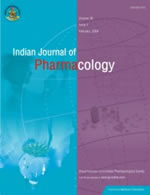
|
Indian Journal of Pharmacology
Medknow Publications on behalf of Indian Pharmacological Society
ISSN: 0253-7613 EISSN: 1998-3751
Vol. 39, Num. 4, 2007, pp. 171-171
|
Indian Journal of Pharmacology, Vol. 39, No. 4, July-August, 2007, pp. 171
Editorial
Postgraduate education in medical pharmacology
R. K. Dikshit
Correspondence Address: Department of Pharmacology, B. J. Medical College, Ahmedabad - 380 016
ram_dikshit@yahoo.com
Code Number: ph07042
The postgraduate course is an important point in the career of a medical student. Pharmacology is now becoming a conscious choice rather than a compulsion, superseding the popular clinical subjects. The reasons for this are many. One of them is that the career prospects in pharmacology are witnessing a sea change due to fresh openings in the academia, pharmaceutical industry and clinical research organizations (CROs). A rapid emergence of pharmaceutical/clinical research on a large scale has provided a fresh boon to the discipline of medical pharmacology (similar to what the endoscopy has done for many clinical disciplines e.g. gastroenterology). Clearly, the future prospects for a medical/clinical pharmacologist are attractive.
The question is ′Are our postgraduate training programmes adequate for the students?′ Education, in any sphere, aims to bring about a behavioral change. The change can prove to be useful only if it is relevant. The relevance itself keeps on changing as per the current or future needs. Accordingly, the education has to be necessarily dynamic. A static process of education will inevitably become redundant and useless. We find a lack of uniformity of the curricula in various Indian universities. It is quite contemporary at some places and archaic at others. The training needs of an MD course need to be standardized and made uniform at all the places. This will not only help the students adjust to their job requirements (be it academics, research or industry) but will also provide them an opportunity to compare their educational performance with the standard until an acceptable level of proficiency is achieved.
Traditional curriculum in post-graduate medical pharmacology includes learning areas such as research methodology, literature search, biostatistics, animal experiments and a study of common poisons and their identification. The current needs dictate that the postgraduates are also trained in basic computer skills, modern educational technology, communication skills and web-based learning. The demands of clinical research, pharmaceutical industry and the CROs emphasize an expertise in a number of relevant tasks e.g. protocol designing, informed consent, bioethics, GCP, design, conduct and monitoring of clinical trials, an in depth understanding of the pharmacokinetics, adverse drug reaction reporting etc. A familiarity with analytical techniques such as spectrophotometry, HPLC, LC-MS is also necessary. A specialist medical pharmacologist should also be knowledgeable about a number of rapidly emerging areas like pharmacoepidemiology, pharmacoeconomics, pharmacovigilance and rational pharmacotherapeutics. Development of additional skills should also be encouraged that may include organizing/participating at CMEs/workshops, scientific writing, e-publishing, e-discussions, microteaching, group discussions, use of statistical and clinical trial softwares etc. Briefly, an effort should be made to organize the teaching programme that utilizes the flexibility, autonomy and self-learning in a constructive manner.
Of late, the majority of the post-graduate students as well as teachers have been indifferent towards animal experiments for a variety of reasons. It is important to preserve the importance of animal experiments in post-graduate training in pharmacology, at least to understand the principles of pre-clinical pharmacology. A fine balance is required to handle this. Even if a few of the relevant, doable experiments are preserved, it will ensure an exposure to several learning areas such as handling and care of animals, statutory requirements and the planning/execution of in-vivo / in-vitro animal experiments. It will, however, necessitate a scientifically maintained animal house as per law. Similarly, dissertation, rotational postings and periodic assessment do also need a re-look. The dissertation should aim at training the student in the nuances of inquiry. It should be planned and executed in a time-bound manner to ensure quality rather than a formality. Rotational postings (during residency) can be used to learn the clinical skills (management of emergencies), conduct small exercises in clinical pharmacology (prescription analysis, utilization studies, ADR monitoring etc) and to get an insight into the pharmaceutical/CRO work. Continued assessment drives learning. It can be easily done through peer evaluation, logbook and written/verbal tests.
Are we prepared for all of this-Perhaps not. Most of our departments are currently giving a listless look. May be, we are in transition and are, therefore confused (animal v/s clinical or conventional v/s contemporary). The first thing, therefore, should be an immediate change in the mind-set (′let us be prepared to change′). We also require a dynamic and astute leadership for our departments. To be able to do some or all of above, we need to have our training methods to be more focused and well planned rather than ad-hoc. The utilization of time and resources should be optimum. We can easily begin with whatever we have and a comprehensive infrastructure can be built later on. Time has come to actually run our programmes in a corporate fashion. We should quickly grab the opportunity that has to us otherwise there are many others who will gladly take it away. It will be heartening to receive comments on the issues raised in this write-up.
Copyright 2007 - Indian Journal of Pharmacology
|
